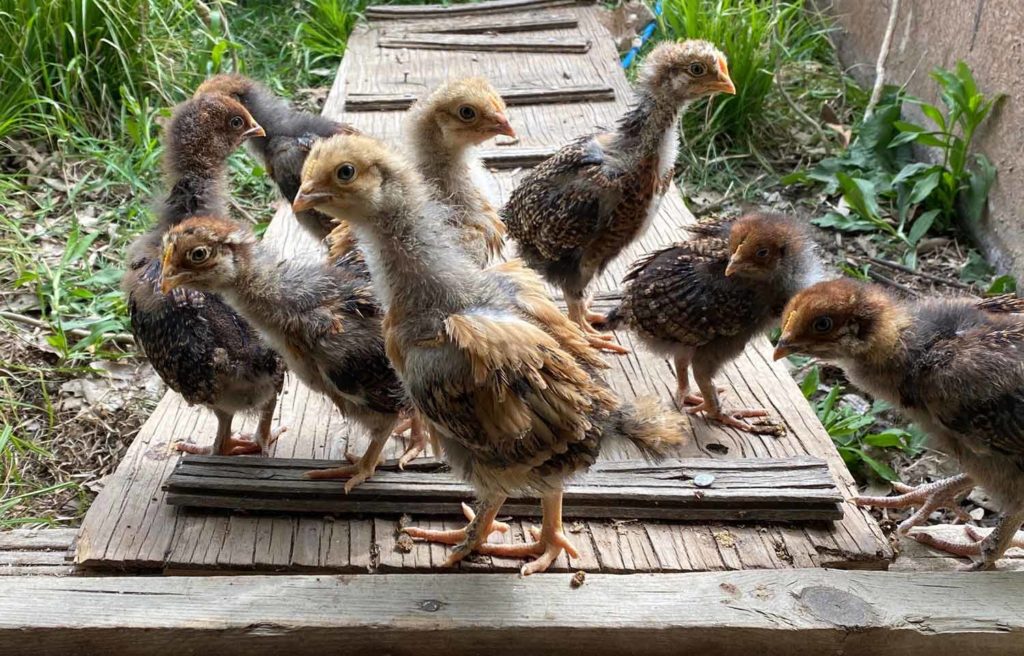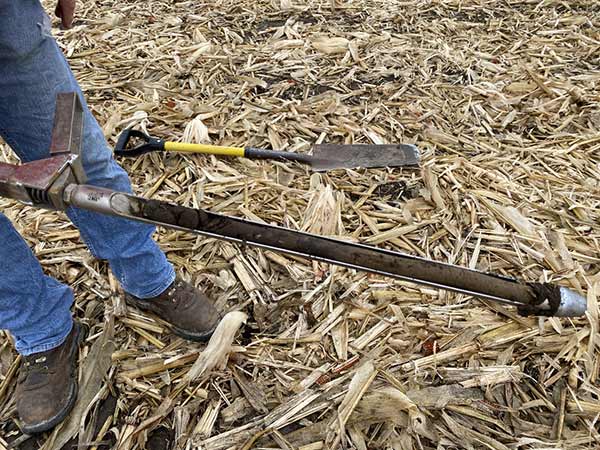
Freshwater’s Carrie Jennings and some dedicated volunteer* scientists have spent several Fridays this spring collecting background data on soil in a conventionally farmed field that will be converted to regenerative practices. The goal is to measure change over time to the water-infiltration and -holding capacity of the soil. Features of the soil such as its density, structure, microbial community, and total carbon have a big impact on the water leaving the field. If more farmers adopt regenerative practices, we may be able to achieve both great productivity and cleaner water.
 The farmer partner in this work is Reginaldo Haslett-Marroquin. You may know of Regi (pronounced RAY-hee) or at least his earlier efforts. He is a Guatemalan immigrant known for his innovative approach to agricultural systems and environmental justice. He was a founding member of the Fair Trade Federation in 1994 and served as director of the Fair Trade Program for the Institute for Agriculture and Trade Policy from 1995 to 1998. He also led the creation, strategic positioning, start-up, and launch of Peace Coffee.
The farmer partner in this work is Reginaldo Haslett-Marroquin. You may know of Regi (pronounced RAY-hee) or at least his earlier efforts. He is a Guatemalan immigrant known for his innovative approach to agricultural systems and environmental justice. He was a founding member of the Fair Trade Federation in 1994 and served as director of the Fair Trade Program for the Institute for Agriculture and Trade Policy from 1995 to 1998. He also led the creation, strategic positioning, start-up, and launch of Peace Coffee.
A better way to raise chickens
More recently, Regi has turned his attention to regenerative poultry systems. He has developed a way of raising chickens outside that he says is better for the environment—as a bonus, it also transforms farmers’ work environment from ammonia-filled buildings to a natural setting. He uses highly productive crops for habitat, including native species such as hazelnuts and elderberries.
Since he focuses on systems change, he has also recently purchased a chicken-processing plant in Albert Lea, and is currently marketing his chickens online through Tree-Range Chicken and in a community-supported agriculture model. Practices have been developed on several farms in the Northfield area and through an earlier partnership with Main Street Project’s regenerative agriculture work. The study site is the newest regenerative poultry systems farm—Salvatierra Farms, located two miles east of I-35 off Highway 19 west of Northfield.
The overarching research goals are to establish baseline conditions, track subsequent changes, and document any specific benefits to soil, its biology, and to water leaving the field. Our work will be coordinated with a study in neighboring Heath Creek that is being conducted by the Cannon River Watershed Partnership. Soils at this farm share characteristics with those across the Minnesota and Cannon river watersheds, our primary agricultural region. If only a small percentage of the farmers there adopted these practices, we could see marked improvement in water quality in the watersheds most impacted by agriculture.
Research team
 The research team includes John Beck, who mapped Rice County with the NRCS and rose to become state soil scientist. He holds a doctorate in soil science and has been evaluating soil health measures for the NRCS in retirement, working closely with them on a project basis.
The research team includes John Beck, who mapped Rice County with the NRCS and rose to become state soil scientist. He holds a doctorate in soil science and has been evaluating soil health measures for the NRCS in retirement, working closely with them on a project basis.
Another team member is Beth Fisher, who holds a doctorate in philosophy in land and atmospheric science and is a professor at Minnesota State University, Mankato, focusing on soil heath and water quality using biogeochemistry and mineralogy. She uses open-source environmental monitoring hardware and software to collect time-series data and supervises the undergraduates who will conduct the lab work.
Professor Dan Hernandez, current chair of the Biology Department at Carleton College, is a grassland ecologist who looks at microbial ecology from a functional standpoint. He and his students will sample and measure microbial activity each fall to supplement what we will learn from the community structure in other tests we hope to fund.
What’s next?
Regi and farm manager Jen Zepeda have already adapted some of their plans to our preliminary soil and vegetation mapping and ecological assessment of the property. They also love to share their work. They plan to offer tours and make results available on Regeneration Farms’ website and through the Regenerative Agriculture Alliance. They held a land dedication ceremony led by members of the Oglala Sioux Community of Pine Ridge, and a Guatemalan Mayan community from Omaha. Carrie and Beth and many other interested community members attended.
The Regenerative Agriculture Alliance has donated $10,000 to Freshwater to cover the costs of the soil analyses being conducted by Mankato State University students. Carleton is offering their student work as an in-kind contribution to the project.
(*The three scientists were so excited about this work, they donated their time and committed to multiple years on the project.)